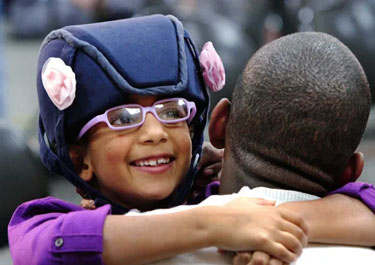Safety Precautions for Children with Seizures
Keeping children with seizures safer through activity restrictions, communication with other caregivers, and helmet use
Activity Restrictions
Losing consciousness or physical control while having a seizure can be dangerous. For example, a child could drown while taking a bath or swimming, or they could crash if driving a car. “Activity restrictions” are recommended to keep kids safe from these horrible possible outcomes. Yet, restricting activities and navigating the balance between independence and safety, particularly for kids, can be difficult.
You can talk to your child’s doctor about the likelihood of a future seizure and the risk of injury. Explore alternatives for activities and the need for supervision, particularly in the following circumstances:
- Water (baths, pools, lakes, ocean): A young child with seizures should be supervised 1 to 1 by an adult within reaching distance while swimming. Older children/teens may swim with a “buddy” if a lifeguard is present.
- Heights (climbing trees, playground equipment, mountains)
- Using sports equipment that moves (bikes, boards, skis), even if wearing a helmet
- Using fire or equipment that may cause a burning injury (water heaters, cooking equipment, candles)
- Driving: State laws concerning driving with epilepsy vary by state; consult the Division of Motor Vehicles for each state.
When Other People Take Care of Your Child with Seizures
Be aware that other people who care for your child (babysitters, family members, friends, teachers, respite workers, etc.) need to know what to do if your child has a seizure, when/how to use their rescue medication if necessary, how closely to monitor them, and how to reach you in an emergency. See Seizure Action Plan (Epilepsy Foundation).
Helmets
Resources
Information & Support
Seizure Disorders (FAQ)
Answers to questions frequently asked by families about their
child and seizures.
For Parents and Patients
Seizure Preparedness and Safety (Epilepsy Foundation)
A rich resource about seizure safety, seizure action plans, seizures and schools, and additional useful topics.
Epilepsy Foundation
A national organization that provides information about epilepsy; programs to improve epilepsy treatment; materials to assist
in helping people with epilepsy find jobs; activities in schools to educate the public; activities to educate policymakers;
funds for research; links to find local and state resources; and news about conferences and other items of interest.
State Driving Laws (Epilepsy Foundation)
A database of driving laws for each state for an individual with epilepsy.
Services for Patients & Families Nationwide (NW)
| Service Categories | # of providers* in: | NW | Partner states (4) (show) | | NM | NV | RI | UT | |
|---|---|---|---|---|---|---|---|---|---|
| Epilepsy Clinics | 1 | 3 | 1 | ||||||
| Prosthetics & Orthotics | 1 | 1 | 1 | 1 | 10 | ||||
| Rehabilitation / Habilitation Services | 2 | 6 | 10 | 3 | 19 | ||||
For services not listed above, browse our Services categories or search our database.
* number of provider listings may vary by how states categorize services, whether providers are listed by organization or individual, how services are organized in the state, and other factors; Nationwide (NW) providers are generally limited to web-based services, provider locator services, and organizations that serve children from across the nation.
Authors & Reviewers
| Author: | Jennifer Goldman, MD, MRP, FAAP |
| Reviewer: | Reilly F Philliben, DO |
| 2022: update: Jennifer Goldman, MD, MRP, FAAPA |
| 2019: update: Lynne M. Kerr, MD, PhDA |
| 2011: update: Denise Morita, MDA |
| 2008: first version: Lynne M. Kerr, MD, PhDA |


